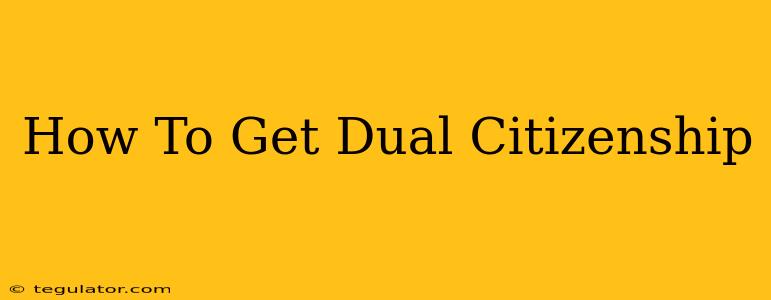Obtaining dual citizenship, the right to hold citizenship in two countries simultaneously, offers a wealth of benefits, from enhanced travel opportunities to increased economic prospects. However, the process can seem daunting. This comprehensive guide breaks down the steps involved, clarifies common misconceptions, and provides valuable tips to navigate this exciting journey.
Understanding Dual Citizenship
Before diving into the specifics, it's crucial to understand what dual citizenship entails. It's not about having two passports; it's about legally belonging to two nations, enjoying the rights and responsibilities associated with each. The eligibility criteria and processes vary drastically depending on your current citizenship and the country you're seeking citizenship in.
Key Benefits of Dual Citizenship
- Increased Travel Opportunities: Access to visa-free or visa-on-arrival travel to a wider range of countries.
- Expanded Job Prospects: Open doors to work and live in multiple countries.
- Enhanced Educational Opportunities: Easier access to educational institutions and scholarships in different countries.
- Financial Advantages: Potential tax benefits and access to broader investment opportunities.
- Stronger Sense of Identity and Belonging: Connect with your heritage and cultural roots.
How to Obtain Dual Citizenship: A Step-by-Step Approach
The path to dual citizenship is not uniform. Each country has its own unique set of rules and regulations. However, the general process typically involves these key steps:
1. Research Eligibility Requirements
This is the most crucial step. Thoroughly research the specific requirements of the country you wish to obtain citizenship in. Factors to consider include:
- Ancestry: Many countries offer citizenship based on ancestry (e.g., having a parent or grandparent who was a citizen).
- Birth: If you were born in a country that grants birthright citizenship (jus soli), you might be eligible.
- Marriage: Marriage to a citizen of another country may grant you citizenship after meeting specific residency requirements.
- Residency: Most countries require a period of continuous residency before granting citizenship. The length of residency varies significantly.
- Language Proficiency: Some countries require demonstrating proficiency in their official language.
2. Gather Necessary Documentation
Once you've determined your eligibility, meticulously gather the required documentation. This often includes:
- Birth certificate
- Passport
- Marriage certificate (if applicable)
- Proof of residency
- Background checks
- Language proficiency tests (if applicable)
- Financial documentation (in some cases)
Ensuring your documents are accurate and properly translated (if necessary) is paramount to avoid delays.
3. Submit Your Application
The application process itself can vary widely. Some countries handle applications online, while others require in-person submissions at embassies or consulates. Follow the instructions precisely and be prepared for potential processing delays.
4. Attend Interviews and/or Examinations (If Required)
Some countries may require interviews or examinations as part of the citizenship application process. Prepare thoroughly for these, demonstrating your knowledge of the country's history, culture, and laws.
5. Oath of Allegiance
Upon successful completion of the application process, you'll typically need to take an oath of allegiance to your new country.
Common Misconceptions about Dual Citizenship
- Dual citizenship automatically means giving up your original citizenship. This is false. Many countries allow for dual citizenship. However, always check the laws of both your current and prospective countries.
- The process is always quick and easy. The application process can be lengthy and complex, requiring significant time and effort.
- Dual citizenship is always free. There are often fees associated with applications and processing.
Tips for Success
- Start early: The process can take years.
- Seek professional guidance: Consider consulting an immigration lawyer or specialist.
- Maintain accurate records: Keep copies of all documents and correspondence.
- Be patient and persistent: The process can be frustrating, but persistence is key.
Obtaining dual citizenship is a significant undertaking, but the rewards can be substantial. By following these steps and understanding the nuances of the process, you can increase your chances of success and unlock a world of new opportunities. Remember to always consult with relevant authorities and legal professionals for the most up-to-date and accurate information.

